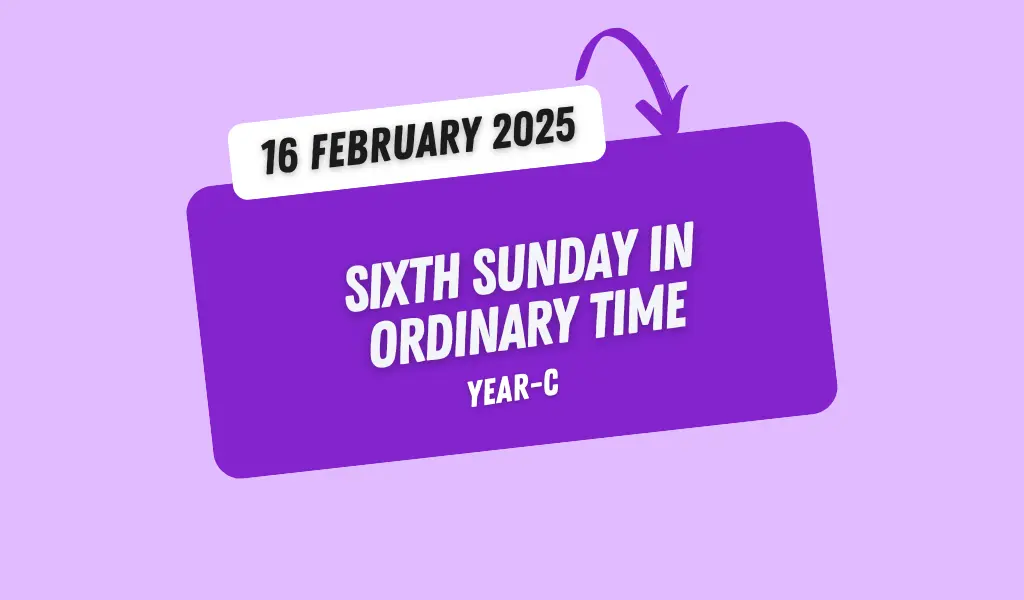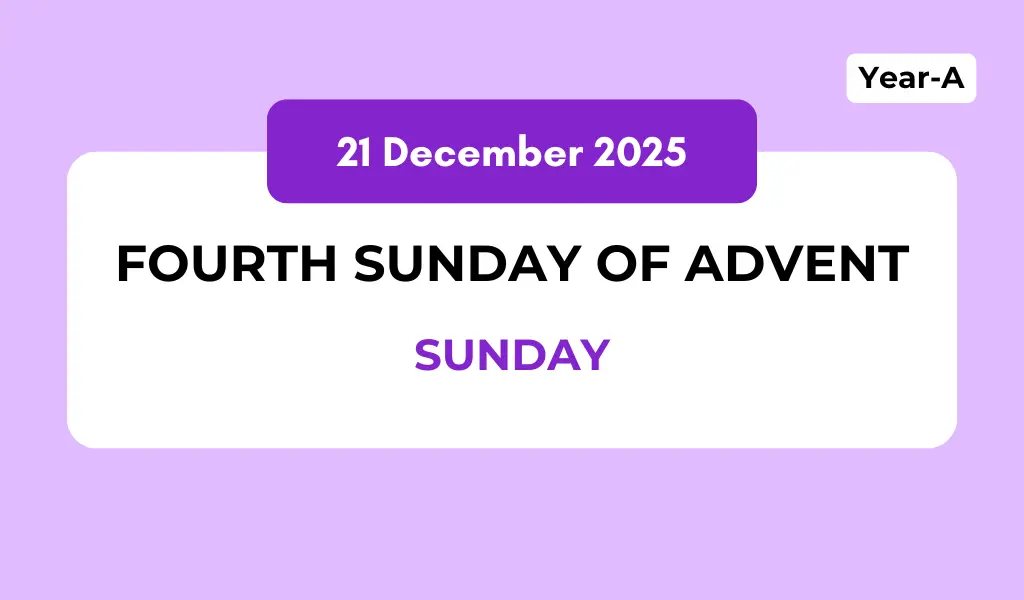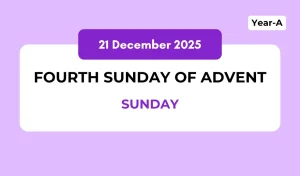Catholic Mass Readings and Reflection February 16, 2025
6th Sunday in Ordinary Time
16th February 2025 (Sunday)
Psalter: Week 2
Reading of the Day
First Reading: Jeremiah 17:5-8
Thus says the LORD: Cursed is the one who trusts in human beings, who seeks his strength in flesh, whose heart turns away from the LORD. He is like a barren bush in the desert that enjoys no change of season, but stands in a lava waste, a salt and empty earth. Blessed is the one who trusts in the LORD, whose hope is the LORD. He is like a tree planted beside the waters that stretches out its roots to the stream: it fears not the heat when it comes; its leaves stay green; in the year of drought it shows no distress, but still bears fruit.
Psalm 1:1-2, 3, 4 and 6 (R. 40:5a)
R/. Blessed the man who has placed his trust in the Lord.
Second Reading: 1 Corinthians 15:12, 16-20
Brothers and sisters: If Christ is preached as raised from the dead, how can some among you say there is no resurrection of the dead? If the dead are not raised, neither has Christ been raised, and if Christ has not been raised, your faith is vain; you are still in your sins. Then those who have fallen asleep in Christ have perished. If for this life only we have hoped in Christ, we are the most pitiable people of all. But now Christ has been raised from the dead, the firstfruits of those who have fallen asleep.
Gospel Acclamation
V/. Alleluia
R/. Alleluia
V/. Rejoice and be glad; your reward will be great in heaven.
R/. Alleluia.
Gospel : Luke 6:17, 20-26
Jesus came down with the Twelve and stood on a stretch of level ground with a great crowd of his disciples and a large number of the people from all Judea and Jerusalem and the coastal region of Tyre and Sidon. And raising his eyes toward his disciples he said: “Blessed are you who are poor, for the kingdom of God is yours. Blessed are you who are now hungry, for you will be satisfied. Blessed are you who are now weeping, for you will laugh. Blessed are you when people hate you, and when they exclude and insult you, and denounce your name as evil on account of the Son of Man. Rejoice and leap for joy on that day! Behold, your reward will be great in heaven. For their ancestors treated the prophets in the same way. But woe to you who are rich, for you have received your consolation. Woe to you who are filled now, for you will be hungry. Woe to you who laugh now, for you will grieve and weep. Woe to you when all speak well of you, for their ancestors treated the false prophets in this way.”
Daily Gospel Reflection
6th Sunday in Ordinary Time
Opener: In human life, always two options are placed before us: bliss and curse. It is left to us what to choose. But each choice will have its own results and consequences
The Word of God of today encounters us with a radical contrast between being blessed and being cursed. It sheds clear light on both the modes of being, on how one becomes blessed or cursed. It places before us the ways and means how one attains bliss and also how one forfeits the same and falls to curse. Subsequently, it also challenges us to make a choice between the two.
The first reading from prophet Jeremiah affirms that excessive trust in human resources and worldly strengths, and alienation from God make one cursed. He is like a desert shrub that is unproductive and fruitless.
In contrast, profound trust in the Lord makes one blessed. He is like a tree planted by water and is deeply rooted, ever fresh and green, ever tranquil and fruit-bearing.
The same contrast between bliss and curse is furthered in the gospel in the light of the beatitudes. Poverty, hunger, weeping and suffering make one blessed, while riches, having full, laughter and self-glory make one cursed.
As evident, there is a clear contrast between the two polarities: Poverty is in contrast to riches. Hunger is in contrast to having full, weeping is in contrast to laughter, and suffering is in contrast to self-glory.
But these need more clarity and cannot be understood at their face and surface level. Accordingly, “poverty” is not merely material poverty. It is poverty in spirit. This implies a profound spirit of humility, self-insufficiency, and total dependence on God and surrender to Him.
On the contrary, “being rich” signifies feeling and acting self-sufficient, self-complacent, arrogant, materialistic, and money-minded.
“Hunger” is not merely the material hunger for food but much more. It signifies a deep hunger and thirst for God, higher things, spiritual concerns, for righteousness and justice.
On the contrary, “having full” signifies a lack of this inner craving but being filled with the things and interests of the world. It is “satisfaction” in indifference and unjust “oppression”. In other words, it is to “be drunk” with worldliness.
“Weeping” is not merely a matter of feeling sad and shedding some tears. It implies a deep sensitivity, tenderness, and compassion, a positive vulnerability to be moved and even wounded by the plight of others. It would also mean the ability and the willingness to be empathetic and in solidarity with those who are suffering.
On the contrary, “laughter” would signify comfort-seeking, seeking temporary gratifications, unhealthy pleasures, unlawful fun, and prohibited deviations. It would also imply deriving happiness at the cost of others, through ridicule, mockery, and making fun.
“Suffering” is not merely physical suffering. It would include insult, persecution, and calumny. It is the spirit of self-abnegation and self-resignation. It is rejoicing to suffer something for Christ considering it as an honor.
This is in contrast to the applause, flattery, and pleasantries of the world; this is seeking cheap popularity, self-projection, and self-promotion. In short, it is all undue craving for self-glory.
Thus, while the positive thrust of the blessedness of discipleship in Luke (Vv. 20-23) is very much similar to that in Mt 5. 3-12, there are some noteworthy differences. There is an addition of a strong tone of curse and condemnation against the non-disciples (Vv. 24-26).
A disciple will be blessed with immense recompense on account of his fidelity. The ingredients of this rewarded bliss will be: becoming rich with the gain of the kingdom of heaven itself, being satiated and filled by God Himself, being consoled and comforted, and being honoured and credited in God’s sight.
But on the other hand, misery awaits those who follow the world and not the Lord: desolation and discomfort for the rich, hunger and deprivation for those who are full, sorrow and pain for those who enjoy and fun about, discredit and misery for those who ride in self-glory and cheap popularity and fame
Direction: Let us not be so short-sighted being caught up with what is present and temporary. Let us wisely steer ourselves to be focused on and oriented to the eternal future







